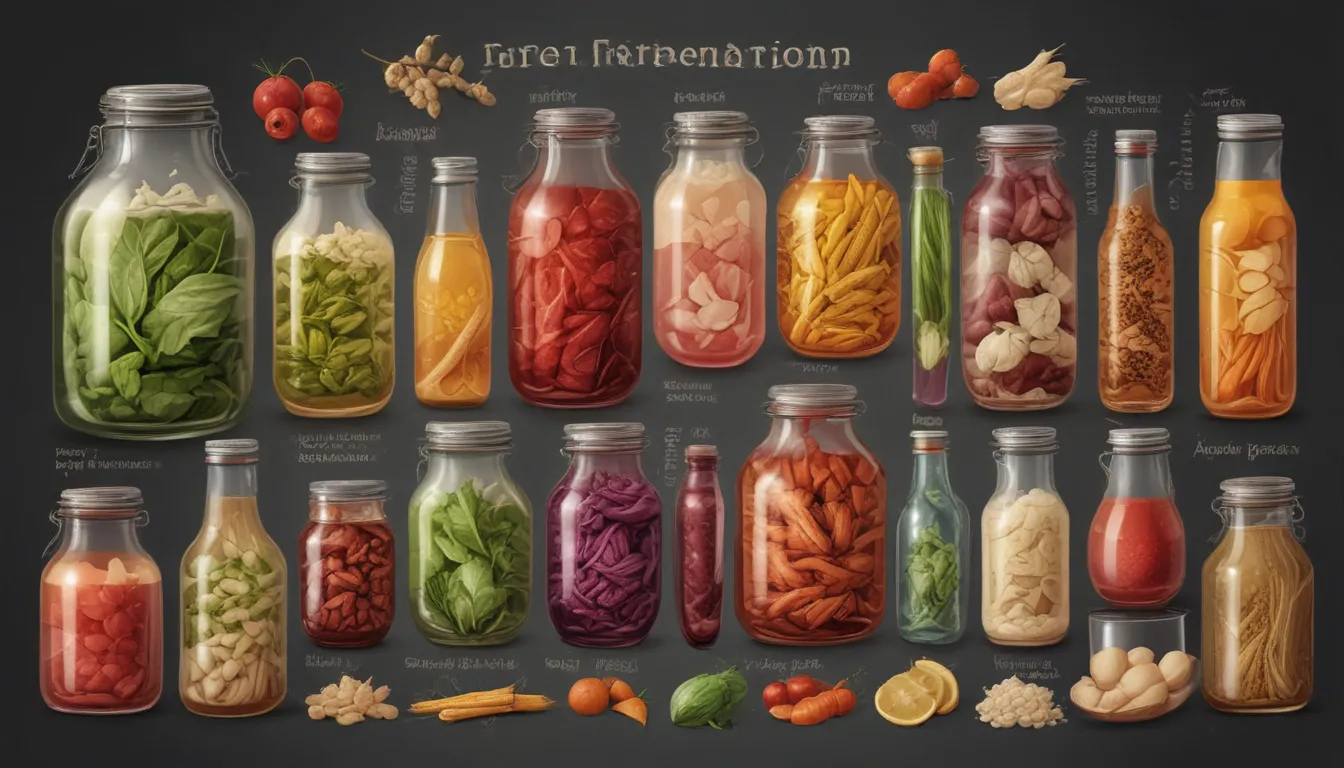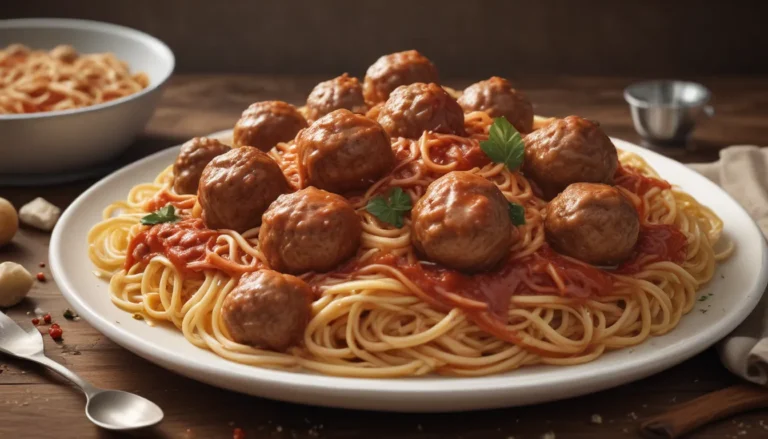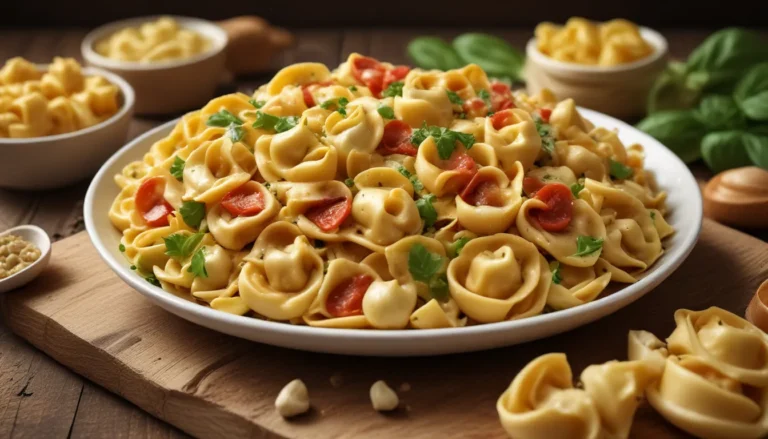The pictures in our articles might not always show exactly what the text is talking about. We use these images to make the article more interesting and eye-catching. They are there to add to the text, but not to replace it or show every detail.
Fermentation is a magical process that has been utilized for centuries to preserve food and enhance its flavors. From the tangy kick of sauerkraut to the bubbly joy of kombucha, fermented foods have captured the hearts and taste buds of many for their unique tastes and health benefits.
Unlocking the Secrets of Fermentation
In simple terms, fermentation is a metabolic process where microorganisms such as bacteria or yeast convert sugars into other compounds like alcohol or lactic acid. This process not only helps in preserving food by creating an acidic environment that prevents the growth of harmful bacteria but also adds complexity and depth of flavor.
Exploring the Fascinating World of Fermentation
Let's dive into the fascinating world of fermentation and uncover 18 intriguing facts about this ancient culinary technique. Whether you are a food enthusiast or just curious about the science behind fermentation, get ready to explore the history, benefits, and wonders of this age-old process.
Unraveling the Mysteries of Fermentation
- Fermentation is an Ancient Art: Fermentation is a time-honored tradition used for centuries to not only preserve food but also create tantalizing flavors. From pickles to sauerkraut, different cultures worldwide have embraced the power of fermentation.
- Fermentation is a Natural Process: When certain microorganisms break down sugars without the presence of oxygen, fermentation occurs. This magical transformation results in compounds like alcohol, lactic acid, or carbon dioxide, giving fermented foods their unique taste and texture.
- Fermented Foods are Rich in Probiotics: Probiotics are beneficial bacteria that promote gut health. Fermented foods like yogurt, kimchi, and kefir are packed with these healthy microorganisms, supporting overall well-being.
- Fermentation Enhances Nutrient Bioavailability: Enzymes produced during fermentation help break down complex nutrients into simpler forms, making them easier for our bodies to absorb. This boosts the bioavailability of essential vitamins and minerals in fermented foods.
- Wine and Beer are Products of Fermentation: The delightful beverages we enjoy, like wine and beer, are the result of fermenting sugars found in grapes and grains. Yeast plays a key role in converting sugars into alcohol and carbon dioxide during the fermentation process.
- Fermentation Transforms Food Flavors: Through fermentation, the flavors of food can be elevated and transformed into culinary delights. From tangy pickles to aged cheese, and umami-rich miso paste, fermentation takes taste to a whole new level.
- Fermented Foods Have a Longer Shelf Life: By promoting the growth of beneficial microorganisms that inhibit harmful bacteria, fermentation extends the shelf life of foods without the need for artificial preservatives or refrigeration.
- Fermentation is Used in Chocolate Production: Chocolate begins its journey with fermented cacao beans that undergo fermentation to develop their rich flavors before being processed into the delicious chocolate products we love.
- Fermentation Reduces Antinutrients in Food: Antinutrients can inhibit the absorption of certain minerals. Fermentation breaks down these compounds, making essential nutrients more accessible to our bodies.
- Fermentation Adds Tang to Sourdough Bread: The distinctive tangy flavor of sourdough bread comes from the fermentation of yeast and bacteria within the dough, resulting in a unique and delicious taste.
- Fermentation is Key in Soy Sauce Production: Soy sauce is crafted through the fermentation of soybeans, roasted wheat, water, and salt over months, giving rise to its rich and savory flavor.
- Fermentation Improves Food Digestibility: The breakdown of complex carbohydrates and proteins during fermentation enhances digestibility, especially beneficial for those with digestive issues.
- Fermentation Produces Vinegar: Acetic acid bacteria ferment ethanol to create vinegar, imparting its signature sour taste to this versatile kitchen staple.
- Fermentation Elevates Sausages and Cured Meats: Many sausages and cured meats undergo fermentation, enhancing their flavor, texture, and shelf life.
- Fermented Beverages Have a Rich History: Various cultures have savored fermented beverages like mead, kombucha, and kvass for millennia, each offering unique flavors and historical significance.
- Fermentation Enhances Coffee Flavors: In certain coffee brewing methods, fermentation is used to intensify the flavor profile of beans, resulting in fruity, floral, or wine-like notes in the brewed coffee.
- Fermentation is a Versatile Culinary Technique: From kimchi and miso to beer and cheese, fermentation opens the door to a world of diverse and culturally significant foods and beverages.
Embrace the Magic of Fermentation
Fermentation is not just a culinary process; it's a window into a world where science, history, and taste converge. It enriches our culinary experiences, offers health benefits, and celebrates the wonder of microorganisms at work.
By understanding the science behind fermentation, we appreciate the artistry of converting carbohydrates into alcohol or organic acids by microorganisms. This not only enhances the flavor and nutritional value of food but also extends its shelf life.
Furthermore, fermentation plays a vital role in gut health by nurturing beneficial bacteria, aiding digestion, and increasing nutrient absorption. It's a journey of discovery that invites us to explore the delicate balance of flavor, health, and tradition.
FAQs: Unlocking the Secrets of Fermentation
- What is fermentation? Fermentation is a chemical process where microorganisms convert carbohydrates into alcohol or organic acids.
- What are the benefits of fermentation? Fermentation enhances flavors, improves shelf life, boosts nutritional value, and promotes gut health.
- Which foods and beverages are commonly fermented? Sauerkraut, kimchi, yogurt, cheese, bread, beer, wine, and kombucha are among the popular fermented products.
- How does fermentation affect nutrition? Fermentation increases nutrient bioavailability, produces additional vitamins, and beneficial compounds.
- Are there risks associated with fermentation? While fermentation is generally safe, improper handling can lead to harmful bacteria growth, emphasizing the importance of following proper techniques.
- Can anyone ferment foods at home? Yes, fermentation can be done at home with basic equipment and ingredients, with resources available for beginners.
- How long does the fermentation process take? The duration varies based on the food or drink being fermented, ranging from days to months.
- Does fermentation always involve live cultures? Not necessarily; while live cultures are often used, some fermentation processes do not require them.
- Can fermented foods be preserved for a long time? Yes, the preservation properties of fermentation extend the shelf life of foods, but proper storage is essential.
- Can everyone enjoy fermented foods? Most people can consume fermented foods safely, but those with health conditions should consult healthcare professionals.
As you embark on your fermentation journey, savor each bite and sip, knowing that you're not just tasting food; you're experiencing a centuries-old tradition that bridges science and taste. Let the magic of fermentation enrich your culinary adventures and inspire your exploration of the remarkable world of microorganisms.
Your Journey Into the World of Fermentation Begins Here
With each fermentation endeavor, you're not just creating food; you're crafting a story, a legacy of flavors passed down through generations. Embrace this ancient art, experiment with new tastes, and celebrate the wonders of fermentation in your kitchen. Cheers to the magic of microbes and the joy of culinary exploration!






